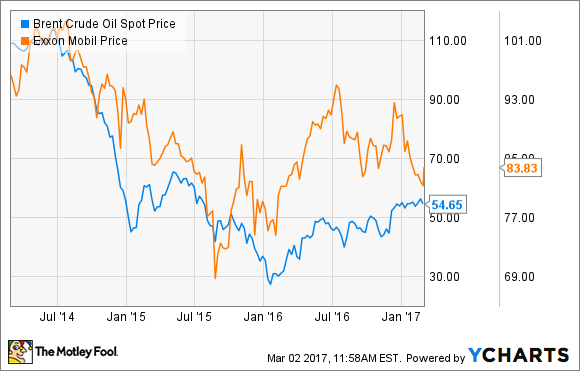Every day, Wall Street analysts upgrade some stocks, downgrade others, and "initiate coverage" on a few more. But do these analysts even know what they're talking about? Today, we're taking one high-profile Wall Street pick and putting it under the microscope...
ExxonMobil (XOM 0.02%) held its long-awaited investor day on Wednesday, and the news did not disappoint.
Laying out plans to ramp capital investment by 16% in 2017, then continue growing capex until the company is spending $25 billion a year on exploration and production of oil and gas deposits through the end of this decade, ExxonMobil sounded a bullish note on the future of the oil market. Exxon touted its "5,500 wells in the Permian and the Bakken" shale, all capable of earning at least 10% profit margins so long as oil doesn't fall below $40 a barrel. Management boasted of plans to expand production in such diverse locales as Canada, Guyana, and the United Arab Emirates, with plans to start five "major" upstream projects over just the next two years.
When all was said and done, Credit Suisse shouted (in effect): "Enough! We give! We'll upgrade you!" And promptly rerated ExxonMobil to neutral (with an $83 price target).

Image source: Getty Images.
So what was it that finally tipped the scales in Exxon's favor? Here are three things you need to know.
1. "$65 oil"
StreetInsider.com outlined the key points from Credit Suisse's upgrade yesterday, and the most important point is this one: Credit Suisse thinks ExxonMobil is right to be optimistic about the oil market, because Credit Suisse sees Brent crude oil -- currently selling just below $55 a barrel -- rising as high as $65 a barrel in the near future.
As Credit Suisse explains, it initially warned of "an oil correction" back in 2014, back when oil was selling for well over $100 a barrel. Credit Suisse downgraded ExxonMobil in response a year later, as oil prices plunged below $50 a barrel. A return to $65-a-barrel oil, though, should put ExxonMobil stock back where it was trading around about late 2014.
2. Which leads us to this chart
As you can see on the below chart, this implies a stock price of roughly $83 a share for ExxonMobil stock.
Brent Crude Oil Spot Price data by YCharts.
3. Cash is king
That's what history would seem to imply, at least. But Credit Suisse has other reasons for liking ExxonMobil stock as well. For example, with an $83 target price and ExxonMobil stock selling for only a bit more than $83 a share today, Credit Suisse thinks the stock is fairly priced at today's forward price-to-earnings ratio of 17.2.
CS admits there are "other Majors which are demonstrably cheaper" than Exxon, calling out Royal Dutch Shell (RDS.A) (RDS.B) here as particularly cheap (Royal Dutch Shell sells for a forward P/E of 11.2). But the analyst also believes that ExxonMobil stock doesn't look too bad, saying it is earning more than "just a maintenance level of free cashflow."
In fact, according to data from S&P Global Market Intelligence, Exxon is actually producing a quite respectable $5.9 billion in positive free cash flow today. That's only half as much as the company was generating back in 2014 ($12.1 billion). But it compares favorably to Royal Dutch Shell, which is spending more on capex, and therefore already burning cash in today's cheap-oil environment.
Bonus thing: What you need to know about Credit Suisse
All that being said, does Credit Suisse's argument add up to a compelling case for upgrading ExxonMobil stock? I don't think so, and here's why:
Even if Credit Suisse is right about ExxonMobil -- about oil prices returning to $65 a barrel, about the size of Exxon's capital investment program, and about the free cash flow, too -- well, comparing Exxon's $344 billion market capitalization to the $12.1 billion in free cash flow that Exxon generated in 2014 results in a price-to-free cash flow ratio of more than 28 on the hypothetical cash profits Exxon could generate in a market charging $10 more for oil than it presently charges today. To me, that doesn't sound like a very cheap price to be paying for Exxon stock -- and it would be even more expensive if Credit Suisse turns out to be wrong about oil prices returning to $65 a barrel.
What's more, Credit Suisse might very well be wrong about that price forecast. Because according to our data here at Motley Fool CAPS, when it comes to picking oil and gas stocks, Credit Suisse's record is simply abysmal:
- A total of 117 affirmative buy/sell recommendations made throughout the industry over the past decade...
- ...but a lowly 36.3% accuracy on those picks.
- Accuracy of 24.2% on its current recommendations...
- ...and a combined 2,097 percentage points' worth of market underperformance across its many, many oil and gas picks.
If this is the kind of analyst you want to be taking advice from on oil and gas stocks, well, that's your choice. For my part, though, I'll be ignoring Credit Suisse's advice on ExxonMobil.






